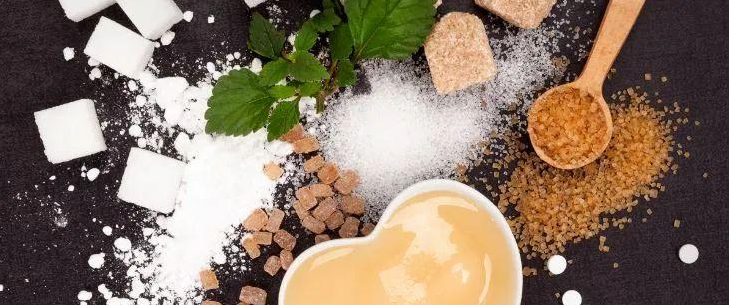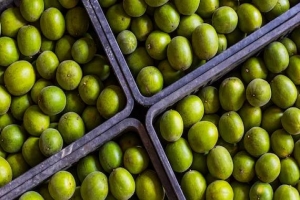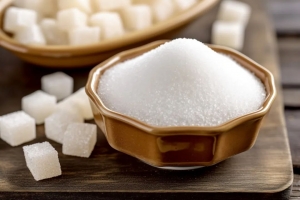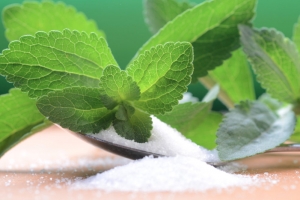Organic Monk fruit Extract:Which is better, natural sweeteners or synthetic sweeteners? Before comparing the pros and cons of the two, let's first understand which sweeteners are natural sweeteners and which sweeteners are synthetic sweeteners. Natural sweeteners mainly include: sucrose, fructose, glucose, maltose, honey, various syrups, oligosaccharides, glycyrrhizin, stevioside and other sweeteners that are directly derived from natural animals and plants or extracted or synthesized from them;
Synthetic sweeteners mainly include: saccharin, cyclamate, palatinose, acesulfame potassium, neotame, aspartame, sucrose and other sweeteners synthesized by artificial chemical synthesis.
Which is better, natural sweeteners or synthetic sweeteners?
Comparison of the advantages and disadvantages of natural sweeteners and synthetic sweeteners

1. Usage history: Natural sweeteners have a longer history of use, while synthetic sweeteners only began to be used after the 1960s.
2. Taste: Natural sweeteners have a better taste and are more likely to give food a unique flavor, so they are more popular. Among synthetic sweeteners, saccharin, which is the most familiar to everyone, will make people feel bitter with just a little bit. In recent years, many new synthetic sweeteners such as cyclamate and neotame have a good taste, which is basically close to sucrose.
3. Sweetness: The sweetness of natural sweeteners is generally not as good as that of artificial sweeteners. The sweetest sweetener currently available, neotame, is 7,000-13,000 times sweeter than sucrose. It has high sweetness, good safety, high stability, low cost and good solubility, making it a new generation of sweetener with broad application prospects.
4. Effect on blood sugar: For diabetic patients and obese people, the most worrying thing about sweeteners is the effect on blood sugar and whether it will make them gain weight. The most commonly used sucrose, glucose, fructose, etc. will have a significant effect on increasing blood sugar, and the sweetness of these sweeteners is relatively low, and the normal addition amount is about 4%, which is not good for diabetic patients. Most synthetic sweeteners will not cause blood sugar to rise, so they are the best choice for diabetic food.
5. Changes in the properties of food: In addition to sweetness, sucrose and honey can also increase the viscosity of food, make food swell and soften, and add color and flavor. Most synthetic sweeteners do not have this function.
6. Safety: Many people believe that natural sweeteners are safe and reliable. This statement makes sense, but it also has loopholes. First of all, natural sweeteners are not safe for diabetic patients. Eating them will cause blood sugar to rise and lead to health effects. Secondly, any food has a quantity regulation. If you eat too much, healthy people will also feel unwell. The principle of moderation also applies to synthetic sweeteners. The synthetic sweeteners currently allowed for use have no toxic side effects on the human body when used within the permitted amount.
Which is better, natural sweeteners or synthetic sweeteners?
A few additional notes about sweeteners:
1. Purchase of sugar-free and low-sugar foods: In order to cater to the needs of the public, manufacturers print sugar-free and low-sugar foods on the packaging of many products. Our investigation found that almost all foods labeled low-sugar have sucrose added, but there is no clear indication of the specific amount of addition. Therefore, it is recommended that you pay attention to the description of the ingredients when purchasing, and choose carefully if you suffer from diabetes.
2. Sugar-free foods do not have a blood sugar lowering effect: Some consumers mistakenly believe that sugar-free foods have a blood sugar lowering effect, which is wrong. In order to ensure the taste of the food, xylitol, aspartame, cyclamate, acesulfame potassium and other sweeteners are often added. These sweeteners do not increase blood sugar, have low calories or no calories, so they can be eaten by diabetics and people who want to lose weight. But at the same time, it should be noted that many sugar-free foods have added thickeners such as dextrin and modified starch, stabilizers, quality improvers, etc. These ingredients can also cause blood sugar to rise, so be careful when purchasing. Some people's blood sugar rises after drinking sugar-free yogurt, which is likely caused by the thickener.
3. The use of functional sweeteners is becoming a growing trend: In the survey, it was found that many milk powder products add oligosaccharides. This is because oligosaccharides can activate the reproduction of intestinal bifidobacteria, improve intestinal flora, enhance intestinal immune function, and reduce diarrhea in infants and young children; it can help digestion and prevent constipation in infants and young children; it can also increase the body's calcium absorption and promote bone development in infants and young children. Xylitol is also widely used in chewing gum, yogurt, and fruit juice because xylitol does not cause blood sugar to rise and has a natural cool feeling. However, it is worth noting that excessive consumption of xylitol may cause diarrhea, and eating too much oligosaccharides will cause abdominal distension.
4. It is also very common to add three or even more sweeteners to a food. This is to make full use of the advantages and disadvantages of natural sweeteners and synthetic sweeteners, which not only gives the food a good taste, but also controls the extent of blood sugar increase, and effectively utilizes the health function of functional sweeteners. From this point, it can be seen that the technology of using sweeteners has become increasingly mature.
 The regulation of Monk Fruit Extract (also known as Luo Han Guo extract) varies across different cou
The regulation of Monk Fruit Extract (also known as Luo Han Guo extract) varies across different cou
 Health Canada Approves Monk Fruit Extract as a Natural Sweetener
Health Canada Approves Monk Fruit Extract as a Natural Sweetener
 New Breakthrough in Allulose: A Healthier Sugar Alternative Gains Momentum
New Breakthrough in Allulose: A Healthier Sugar Alternative Gains Momentum
 Understanding Reb-M: The Benefits of a Next-Generation Sweetener
Understanding Reb-M: The Benefits of a Next-Generation Sweetener